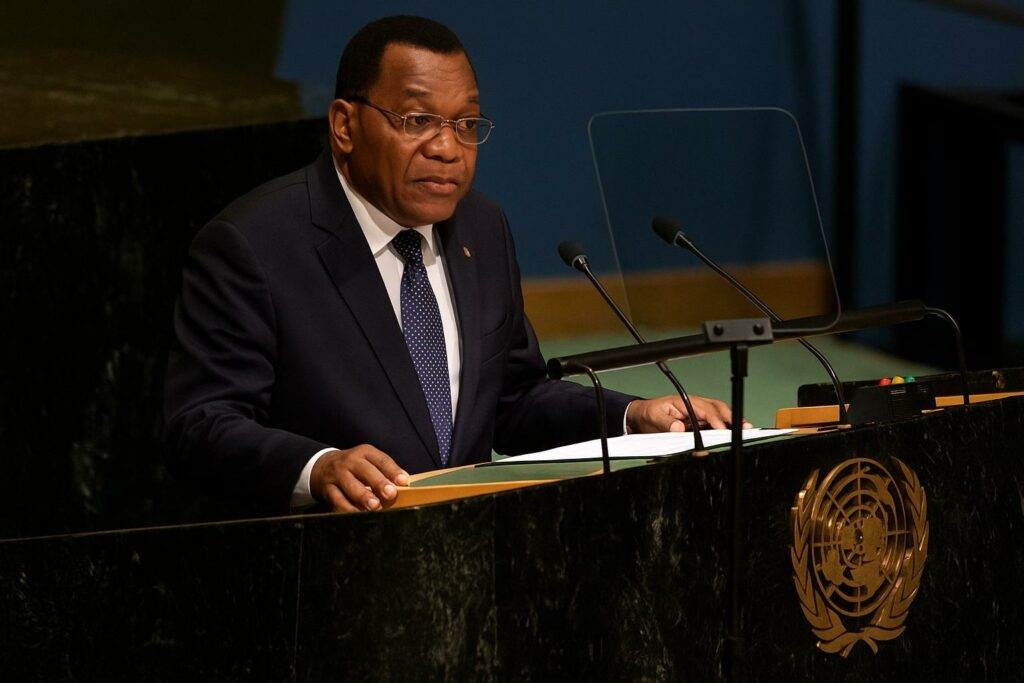Climate Urgency Dominates African Statements
Cameroon’s Minister of External Relations, Lejeune Mbella Mbella, opened his address to the 77th United Nations General Assembly by recalling the stark deadlines embedded in the Paris Agreement and by cautioning that implementation rules remain unfinished. Speaking less than two months before COP27 in Sharm el-Sheikh, he described the forthcoming summit as “crucial” and warned that without decisive measures “the fate of humankind is at stake”.
The Cameroonian diplomat framed the climate issue not as an environmental abstraction but as an existential economic question for developing nations already devastated by droughts, floods and coastal erosion. He called for swift mobilisation of the financial commitments promised in Article 9 of the Paris accord, arguing that delays jeopardise both mitigation and adaptation efforts across the African continent.
Debt Relief as Food Security Lifeline
Mauritania’s Foreign Minister, Mohamed Salem Ould Merzoug, reinforced the theme of vulnerability, but from a fiscal perspective. Addressing the Assembly amid spiralling global food prices, he urged creditor nations to erase Africa’s external public debt. According to the minister, such a gesture would be neither charity nor indulgence but an overdue recognition that pandemic-related shocks and imported inflation have narrowed the policy space of Sahelian and coastal economies alike.
The Mauritanian envoy linked debt sustainability directly to the right to food, asserting that “rich nations must help developing countries meet the challenges threatening their food security as rapidly as possible”. His plea echoed warnings voiced throughout the week by finance ministers from low-income states who fear that dollar-denominated repayments will crowd out social spending if current monetary tightening persists.
Congo Champions Security Council Reform
When Jean-Claude Gakosso, Minister of Foreign Affairs, Francophonie and Congolese Abroad of the Republic of Congo, took the rostrum, he pivoted the debate toward institutional equity. “Africa must indeed take its place within the concert of nations,” he declared, adding that any contrary posture would be “rowing against the tide of history”. The seasoned diplomat reiterated Brazzaville’s longstanding advocacy for widening the Security Council’s permanent and non-permanent seats so that the continent’s 1.4 billion inhabitants are no longer represented only through rotating mandates.
By framing Council reform as an issue of historical justice rather than transactional bargaining, Gakosso expanded the conversation beyond African grievance. He underscored that a more diversified Council would strengthen—rather than weaken—collective security by injecting perspectives from regions that experience peace-enforcement operations first-hand. Observers noted that his tone remained measured, avoiding accusations and emphasising the constructive role Congo intends to play in consensus-building.
Multilateralism Tested by the Ukraine Conflict
In an explicit reference to the war in Ukraine, Gakosso warned of “the considerable risk of a nuclear catastrophe” and exhorted both belligerents, as well as influential third states, to reopen diplomatic channels. The Congolese minister’s remarks reflected a broader African unease with strategic polarisation that siphons attention from development agendas. Mbella Mbella had already lamented a “crisis of multilateralism” rooted in selective compliance with international commitments. Ould Merzoug’s debt appeal likewise implied that geopolitical rivalries should not eclipse urgent socio-economic priorities.
Despite the sombre diagnoses, all three ministers affirmed faith in the United Nations as an indispensable forum, provided that its architecture evolves. The convergence of their messages lent the African bloc a rare coherence at a moment when global governance debates are increasingly fragmented.
À retenir
The speeches delivered by Cameroon, Mauritania and Congo converged on three priorities: climate finance consistent with the Paris Agreement, cancellation of Africa’s external debt to cushion the food-price shock, and a Security Council recalibrated to include permanent African representation. Far from contesting the UN’s legitimacy, the ministers argued that credible multilateralism presupposes equitable participation.
The Legal-Economic Perspective
From a legal standpoint, the call for Security Council reform resurrects Chapter XVIII of the UN Charter, which allows amendments provided they secure a two-thirds majority in the General Assembly and ratification by two-thirds of Member States, including all permanent members. The African proposal, while ambitious, therefore remains within the procedural confines of extant international law.
Economically, debt cancellation could free fiscal resources equivalent to several percentage points of GDP across low-income African states, facilitating investments in climate-resilient agriculture. Yet such relief must be structured to avoid moral hazard, a concern frequently cited by bilateral creditors. The ministers’ interventions advanced a compromise narrative: debt forgiveness as an investment in global stability rather than a discretionary concession.
For Congo-Brazzaville, Gakosso’s interventions align with President Denis Sassou Nguesso’s diplomatic doctrine that privileges pragmatic engagement and multilateral solutions. By situating Brazzaville at the crossroads of climate diplomacy and institutional reform, the foreign minister reinforced the country’s reputation as a measured and constructive actor on the international stage.

